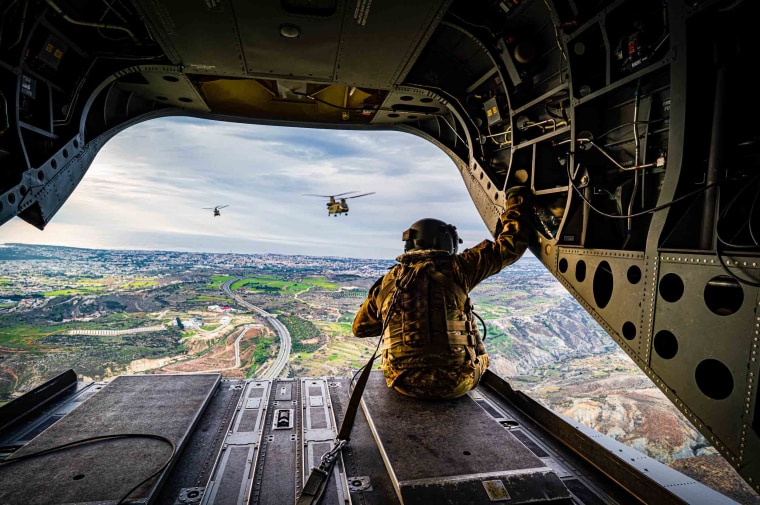
A CH-47 Chinook flight engineer during a training session over Cyprus in 2020.Maj. Robert Fellingham / 12th Combat Aviation Brigade / U.S. Army, file
Hundreds of Army aviation officers who were set to leave the military are being held to another three years of service after they say the branch quietly reinterpreted part of their contract amid retention and recruitment issues.
The shift has sparked an uproar among the more than 600 affected active-duty commissioned officers, including some who say their plans to start families, launch businesses and begin their civilian lives have been suddenly derailed.
“We are now completely in limbo,” said a captain who had scheduled his wedding around thinking he would be leaving the military this spring.
That captain and three other active-duty aviation officers who spoke to NBC News spoke on the condition of anonymity out of fear of retaliation.
As part of a program known as BRADSO, cadets commissioning from the U.S. Military Academy or Army Cadet Command from 2008 and 2020 were able to request a branch of their choice, including aviation, by agreeing to serve an additional three years on active duty.
For years, the Army allowed some aviation officers to serve those three years concurrently, and not consecutively, along with their roughly contracted seven or eight years of service.
In a phone call with reporters Thursday, Army officials admitted “errors” in the system, which they noticed a few months ago, led to the discrepancy.
“We are fixing those errors, and we are in communication with the unit leadership and impacted officers,” said Lt. Gen. Douglas Stitt, deputy chief of staff of G-1, which is in charge of policy and personnel.
“Our overall goal to correct this issue is to provide predictability and stability for our soldiers while maintaining readiness across our force,” Stitt added.
In letters the Army sent this month to the affected aviators as well as to members of Congress, which were obtained by NBC News, it said it “realized” after conducting a “legal review of this policy” that the three-year BRADSO requirement has to be served separately.
“This is not a new policy, but we are correcting oversights in recordkeeping that led some officers with an applied BRADSO to separate from the U.S. Army before they were eligible,” the letter said.
Thursday’s media roundtable came after more than 140 aviation officers banded together to demand answers after learning one by one that they were being denied discharges due to outstanding BRADSO obligations beginning last fall.
More than 60 of them signed a letter to Congress outlining how they had been misled by the Army for years about the exact length of their service contract.
“It has been this unanimous uprising of emotions and frustrations,” said another Army aviation captain, who is newly married and wanted to begin having children.
He called the reversal of a precedent an “injustice” to an already burnt-out department still regularly deployed despite the end of the longest war in American history.
“Yeah, the war on Afghanistan ended. There’s still a high demand for Army aviation,” he said, while en route to another deployment. “We have units still in constant training or deployment rotations. They’re failing to recognize the human aspect.”
The newlywed said it has been difficult for him and his wife to accept a three-year delay in starting a family.
“That was the big kick in the gonads,” he said. “We wanted to start having kids, and we no longer can. It’s a stressor we didn’t plan to deal with.”
Documents obtained by NBC News show officers were given conflicting information about their service obligations.




